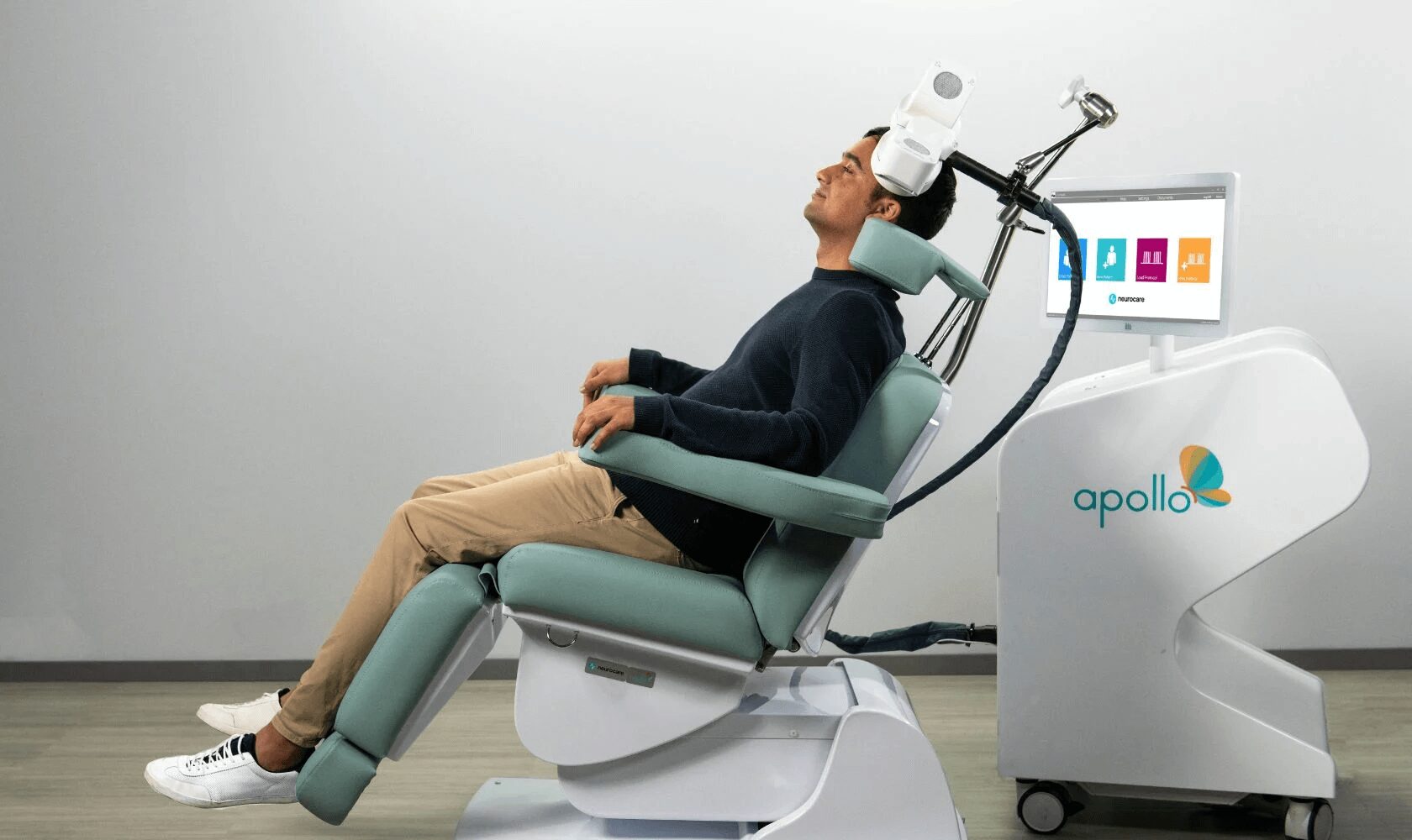
Benefits of TMS for Military Personnel: Addressing Unique Challenges
Benefits of TMS for Military Personnel: Addressing Unique Challenges
Military members must endure significant physical, emotional, and psychological stress in an infinite number of scenarios, from combat operations to readjusting to civilian lifestyles.
These experiences carry significant residual effects. For example, conditions like Post-Traumatic Stress Disorder (PTSD), depression, and anxiety have a disproportionate effect on military members.
Some military members find medication and talk therapy helpful, but for many, when one of these treatment options only works for a fraction of them, they are left to suffer the fallout alone, and their survival, while a treatable condition, is difficult.
That’s where Transcranial Magnetic Stimulation (TMS) comes in – an FDA-approved, non-invasive therapy that creates magnetic fields to activate certain brain regions that regulate mood and emotional functioning. For military members, TMS is a beacon of hope at the end of the road and offers a chance of changing their currently suffocating lives when other traditional treatment options have failed.
- What is Transcranial Magnetic Stimulation (TMS)?
- Why Military Personnel Face Unique Mental Health Struggles
- 7 Key Benefits of TMS for Military Personnel
- Comparing TMS to Traditional Treatments
- Real Stories: How Veterans Found Relief with TMS
- Accessibility and Availability of TMS for Military Personnel
- Conclusion: An Optimistic Way Forward with TMS
- FAQs on TMS for Military Personnel
What is Transcranial Magnetic Stimulation (TMS)?
How TMS Works in the Brain
Transcranial Magnetic Stimulation (TMS) utilizes pulsed magnetic fields to influence targeted areas of the brain with known neurophysiology. Primarily, TMS is applied to the prefrontal cortex, which is known as a central area of the brain that influences mood, decisions, and emotion. TMS helps the brain restore and reestablish underused neural circuits, and promotes a healthier adjustment of thought and emotion.
FDA Approval and Safety
In 2008, the FDA approved TMS for treatment-resistant depression. Recently, TMS has received expanded approvals for Obsessive Compulsive Disorder and trials for smoking cessation and Post-Traumatic Stress Disorder (PTSD). TMS is non-invasive, well-tolerated, and reportedly extremely safe. TMS is an excellent alternative option for soldiers who may have attempted other pathways and may have exhausted those options.
Why Military Personnel Face Unique Mental Health Struggles
Military Contact and PTSD
The dangers of imminent danger, the possibility of losing friends, and living in a world where all we see is tragedy and traumatic events all make way for PTSD that nearly 1 out of 5 veterans returning from the theater of operations face from their time engaged in combat in Iraq and Afghanistan. The symptoms of nightmares, flashbacks, hyper vigilance, forgetting basic duties, and living under stress make reintegration difficult.
Stress of Training and Deployment
Even when not engaged in enemy combat, military training and deployments suffice to create chronic stress. Always being away from family for long periods of time and missions that require quick decision-making and actions create the conditions for depression, anxiety, and burnout.
Transition to Civilian Life
The difficulties of transitioning back to civilian life include finding a job, creating time with a family that is no longer military but civilian, and creating a new role in life and rebranding as an ex-military service member. Many veterans face isolation and indebtedness, engage in substance abuse and/or hopelessness without the proper coping skills and support systems.
7 Key Benefits of TMS for Military Personnel
1. Proven Treatment for PTSD Symptoms:
Research indicates that TMS can dramatically reduce PTSD symptoms like flashbacks, intrusive thoughts, and emotional numbness. Unlike a prescription medication that is taken systemically, TMS works to stimulate the brain pathways damaged by trauma, allowing the veteran to break through to a place of more emotional control and resilience.
2. Reduced Depression and Anxiety:
Many service members have treatment-resistant depression or anxiety. When medications don’t bring relief, TMS can reduce the depressive episode and reduce anxiety.
3. Non-chemical, Non-invasive Treatment:
TMS does not introduce a medication or other chemical agent into the body. For service members who are often reluctant to take medications due to potential side effects, concerns over dependency, or conflicts with other treatments, TMS is a perfectly reasonable option.
4. Increased Cognitive Function and Attention:
In addition to emotional changes, TMS has been shown to increase attention span, memory, and decision-making capabilities, all necessary for the military and civilian workforce.
5. Helps Resettle into Civilian Life:
By removing mental health burdens, TMS allows veterans to reconnect with their families, continue their education, and find stable jobs.
6. Few Side Effects Compared to Medications:
The only known side effects related to TMS are mild headache and scalp discomfort, which are much less detrimental than the weight gain, fatigue, or sexual dysfunction connected to antidepressant medications.
7. Long-term Mental Resilience:
Studies show the effects of TMS can be sustained for months to years by follow-up care. For veterans, “freedom” from lasting and debilitating symptoms is so valuable.
Comparing TMS to Traditional Treatments
Medications versus TMS
Antidepressant medications can take a while to get the right treatment working. Often, the success rate is only about 30% to 40%. TMS provides a non-systemic treatment that only targets the brain without affecting the rest of the body.
Therapy versus TMS
While talk therapy can be an effective means of treatment, many veterans have a hard time participating and engaging in therapy due to emotional resistance. TMS can be an effective precursor to therapy, providing relief from mental health symptoms that can help with more effective therapy.
TMS to matter with holistic care
The best outcomes involve a multi-modal approach. E.g., TMS, counseling, along with mindfulness exercises, physical exercise, and peer support groups.
Real Stories: How Veterans Found Relief with TMS
TMS has been shown to yield significant improvements for many veterans struggling with depression and PTSD, even after years of suffering. It is common for individuals to recover their sleep cycle and experience any enjoyment in life for the first time in decades. For veterans who once accepted a life of suffering and despair, TMS is a chance at a new life they never believed possible.
(For further stories, consult the lists of the Department of Veterans Affairs resources.)
Accessibility and Availability of TMS for Military Personnel
VA Hospital and Coverage:
VA hospitals, under the U.S. Department of Veterans Affairs, have expanded their access to TMS programs and have some coverage of treatment for eligible veterans.
Private Clinics and Specialized Programs:
Private TMS clinics may also provide care to military personnel; some clinics may even partner with veteran organizations to reduce cost and access.
Conclusion: An Optimistic Way Forward with TMS
Military members have to face several challenges related to mental health. The use of Transcranial Magnetic Stimulation provides hope for all military types of personnel. It reduces PTSD symptoms, builds resilience in new situations, and helps improve focus. Most importantly, it builds personal empowerment over chronic conditions.
As TMS becomes increasingly available through VA hospitals and private clinics as a paying client, we think the future is optimistic for those who have sacrificed so much for every one of us.
Also, read these blogs:
- How TMS Is Helping Veterans Address Mental Health Challenges
- How TMS Helps Military Members & Dependents
FAQs on TMS for Military Personnel
Is TMS safe for veterans suffering from PTSD?
Yes. TMS is now an FDA-approved device and has been shown to reduce PTSD symptoms with minimal potential side effects.
How long does a TMS session take?
Most sessions take between 20 and 40 minutes, and the course of treatment typically lasts between 4 and 6 weeks.
Can TMS replace medication?
Not always. Some veterans can reduce or cease their medication when undergoing TMS. However, it is often used together with other treatments.
Will insurance cover TMS for military personnel?
Many insurers will cover TMS to treat depression and some cases of PTSD. This includes the VA.
Is the effect of TMS permanent?
The effects of TMS can last for months to years. Some Veterans may require maintenance sessions depending on severity.
Can active-duty use TMS?
Yes, active duty can receive TMS depending on the base and location. Active duty service members should check with their military medical providers for eligibility and use.



